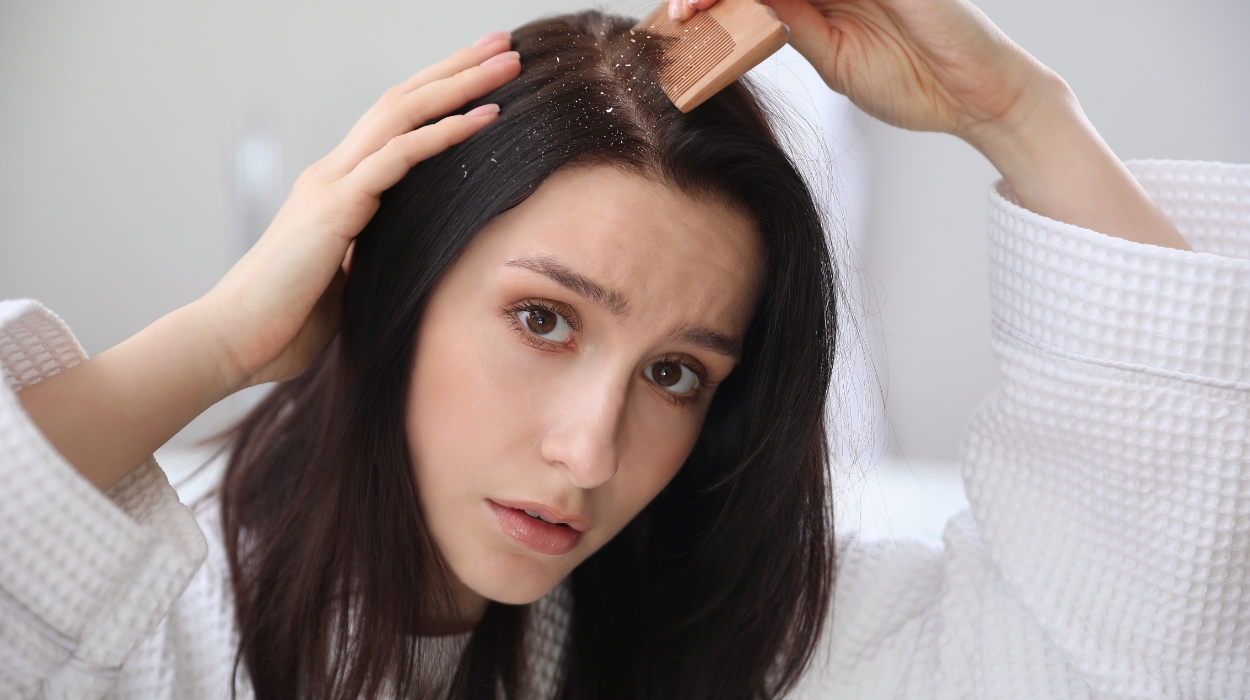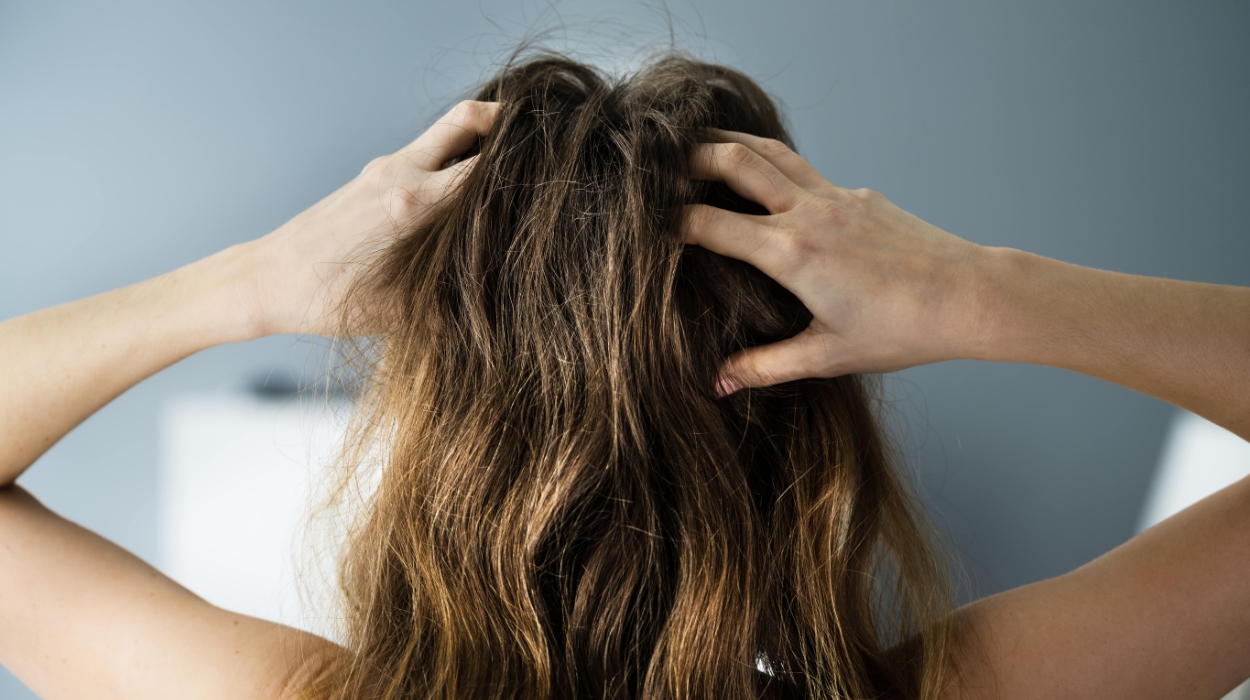 Expert's opinion
Expert's opinion
Expert's opinion
The article is a subjective view on this topic written by writers specializing in medical writing.
It may reflect on a personal journey surrounding struggles with an illness or medical condition, involve product comparisons, diet considerations, or other health-related opinions.
Although the view is entirely that of the writer, it is based on academic experiences and scientific research they have conducted; it is fact-checked by a team of degreed medical experts, and validated by sources attached to the article.
The numbers in parenthesis (1,2,3) will take you to clickable links to related scientific papers.
Does Dandruff Cause Hair Loss? The Link & Ways To Avoid 2024

Dandruff is a common scalp condition that affects millions of people worldwide, characterized by the presence of white flakes on the scalp, which can cause itching and irritation. About 50 million[1] Americans have dandruff and they buy and use hair products to relieve itchy and flaky scalp. If you are one of them, you may wonder if dandruff can lead to hair loss.
Fortunately, there are many preventive and therapeutic factors that we can take for dandruff. We will also cover these factors in this article.
Let’s explain in more detail.
Can Dandruff Cause Hair Loss?
- Around 50 million Americans suffer from dandruff,[1] leading to annual spending of $300 million on over-the-counter remedies to relieve scalp itching and flaking.
- While dandruff is not a direct cause of hair loss, chronic and severe dandruff can damage hair follicles and lead to hair loss over time.
- Yeasts like Malassezia and Candida albicans are among the factors linked to dandruff.
- Keeping your scalp clean and moisturized and avoiding harsh chemicals can help prevent dandruff and hair loss. Stress management and a healthy diet also contribute to your scalp and hair health.
- Anti-dandruff or medicated shampoo helps control dandruff and prevent hair loss, but it’s better to obtain such products by consulting your dermatologist.
- Seeing a dermatologist if symptoms persist is essential for preventing hair loss from dandruff.
Does Dandruff Cause Hair Loss?
Dandruff-related hair loss can be caused by an itchy scalp and irritation, leading to scratching and pulling of hair. This irritation can affect hair growth, damage the hair follicles, and cause hair to fall out. In severe cases, repeated scratching can cause scalp scarring, leading to permanent hair loss, such as baldness.
Suppose the cause of dandruff is a yeast-like infection or other medical condition such as seborrheic dermatitis. These conditions can lead to inflammation and damage to the scalp hair follicles, which can weaken the hair roots and cause hair fall. But this is generally a temporary hair loss and disappears with medical treatment.
What Conditions Can Cause Dandruff?
You may wonder if dandruff, dry scalp, or dandruff shampoo causes hair loss. To understand these effects, we first need to ask about the reasons for dandruff.
Dandruff is a common scalp condition that several factors can cause, including:
Dry Scalp

Imbalances in the sebum levels[2] of the scalp can lead to dandruff. When the scalp becomes dry, it can lead to flaking and itching, common symptoms of dandruff. A lack of moisture in the scalp can cause the skin to become irritated and more prone to dandruff.
In addition, a dry scalp can disrupt the balance of the natural oils that protect and nourish the scalp, making it more susceptible to inflammation and infection.
Infections
Dandruff can sometimes lead to bacterial or fungal infections[3] of the scalp, particularly the Malassezia[4] and Candida species if the scalp is scratched or irritated. These infections can cause symptoms such as redness, swelling, and pus-filled blisters, worsening the underlying dandruff condition.
In severe cases, scalp infections can also lead to hair loss. It’s important to maintain good scalp hygiene by washing your hair regularly with a gentle shampoo, avoiding sharing combs or hairbrushes with others, and avoiding scratching or picking at your scalp to prevent opportunistic scalp infections that may worsen dandruff.
Suppose you notice any signs of infection, such as pus or increasing redness or swelling. In that case, it’s important to seek medical attention immediately to prevent the infection from spreading and causing further damage.
Seborrheic Dermatitis
Seborrheic dermatitis[1] is a more severe and chronic form of dandruff that is characterized by red, scaly patches on the scalp and can sometimes extend to other areas of the body. The exact cause of seborrheic dermatitis is unknown, but factors such as hormonal imbalances, stress, and genetics may play a role. Like dandruff, seborrheic dermatitis is also linked to an overgrowth of yeast on the scalp, particularly the Malassezia[5] species.
Treatment for seborrheic dermatitis may include prescription medications such as antifungal or steroid creams and lifestyle changes to reduce stress and improve overall scalp health. If left untreated, seborrheic dermatitis can lead to hair loss and other complications, so it’s important to seek medical attention if you suspect you may have this condition.
Scalp Psoriasis
Scalp psoriasis is an autoimmune disorder[6] that can cause flaky skin, an itchy and red scalp, burning pain, and dry, cracked skin that may bleed.
While scalp psoriasis does not cause dandruff, it can sometimes lead to bacterial or secondary fungal infections that can result in dandruff-like symptoms. It’s important to see a dermatologist for an accurate diagnosis and appropriate treatment plan if you’re experiencing symptoms of scalp psoriasis or dandruff.
Allergic Reactions
Dandruff can sometimes be a symptom of an allergic reaction to a hair care product or ingredient. Certain ingredients commonly found in hair products, such as fragrances, preservatives, and sulfates, can irritate sensitive skin and trigger an allergic reaction in some people, causing itching, redness, and flaking on the scalp.
Suppose you suspect that an allergic reaction may be causing your dandruff. It’s important to identify the trigger and avoid it in the future. You can try switching to fragrance-free or hypoallergenic hair care products or consult a dermatologist to determine which ingredients are causing the reaction. In some cases, a patch test may be necessary to identify the specific allergen.
Oily Scalp
An oily scalp can also contribute to the development of dandruff[2] besides a dry scalp, as the excess oil can create an environment that promotes yeast growth on the scalp.
When combined with dead skin cells and sweat, the excess oil can also lead to the formation of flakes and itching. People with oily scalps may be more prone to developing dandruff, especially if they don’t shampoo frequently enough to remove the buildup of oil and dead skin cells.
Hormonal Changes
Hormonal changes[7] can also play a role in the development of dandruff. In some cases, hormonal imbalances, such as those that occur during puberty, pregnancy, or menopause, can trigger an overproduction of oil on the scalp, leading to yeast growth and dandruff development.
In men, male pattern baldness (androgenic alopecia) is related to androgens, the male hormone testosterone, and its derivatives. Women also experience female pattern baldness, which manifests as more general, widespread hair thinning. Hair thinning in women is often associated with menopause and may be associated with other age-related changes in the skin.
It is important to use special products for men and women in case of dandruff.
Ways To Avoid Dandruff Hair Loss
Dandruff can be a frustrating and uncomfortable condition, but it doesn’t have to lead to hair loss; it is possible to relieve dandruff. There are many hair products on the market today to address this problem. Here are some ways to treat dandruff hair loss:
Keep Your Scalp Clean

Regularly washing your scalp with anti-dandruff or medicated shampoos can help remove excess oil, dead skin cells, and flakes that can contribute to both dandruff and hair loss.
Avoid Chemicals And Heat Applications
Avoid using harsh chemicals on your scalp, such as hair dye or other cosmetic products, which can irritate the skin and exacerbate dandruff. Also, limiting your use of heat styling tools is essential, which can lead to thinning hair and a damaged scalp.
Moisturize Your Scalp
A dry scalp can worsen dandruff, so keeping your scalp moisturized is essential. Consider using gentle scalp oils and conditioners to help soothe and hydrate the skin.
Use Anti-Dandruff Products
Over-the-counter anti-dandruff shampoos containing active ingredients like ketoconazole, salicylic acid, or zinc pyrithione can help control dandruff and prevent hair loss. After consulting your doctor, you can try to relieve your scalp with these products.
Brushing Hair
Brushing your hair regularly removes dead skin cells and distributes oils evenly throughout your scalp.
Stress Management
Stress can trigger dandruff and hair loss, so it’s important to find ways to manage stress, such as yoga, meditation, or deep breathing exercises.
Maintain A Healthy Diet
A healthy, well-balanced diet rich in vitamins and minerals, especially vitamin B and zinc, can help support hair health and prevent hair loss.
Seeing A Dermatologist
If your dandruff and hair loss persists despite using over-the-counter remedies, it’s important to see a dermatologist who can help diagnose and treat underlying scalp conditions that may be contributing to your symptoms.
Conclusion
Dandruff is a common scalp condition that affects many people, and while it does not directly cause hair loss, it can contribute to hair loss in some cases. It is caused by several factors, and the underlying cause may vary from person to person.
Identifying the cause of dandruff is important to determine the most effective treatment plan. If you have persistent dandruff or other symptoms, it is important to consult a dermatologist for proper diagnosis and treatment.
But generally, by maintaining good scalp hygiene, avoiding stress, eating a healthy, balanced diet, and seeking dandruff treatments when necessary, you can prevent dandruff and reduce the risk of hair loss. Remember to consult a dermatologist if you experience persistent dandruff or hair loss to rule out any underlying medical conditions.
+ 7 sources
Health Canal avoids using tertiary references. We have strict sourcing guidelines and rely on peer-reviewed studies, academic researches from medical associations and institutions. To ensure the accuracy of articles in Health Canal, you can read more about the editorial process here
- Borda, L.J. and Wikramanayake, T.C. (2015). Seborrheic Dermatitis and Dandruff: A Comprehensive Review. Journal of clinical and investigative dermatology, [online] 3(2). doi:https://doi.org/10.13188/2373-1044.1000019.
- Yoon, J.-S., Shim, J., Lim, J.-M. and Sun Gyoo Park (2020). Biophysical characteristics of dandruff‐affected scalp categorized on the basis of sebum levels. Journal of Cosmetic Dermatology, [online] 20(3), pp.1002–1008. doi:https://doi.org/10.1111/jocd.13626.
- Jain, S., Arora, P. and Lalit Mohan Nainwal (2022). Essential Oils as Potential Source of Anti-dandruff Agents: A Review. Combinatorial Chemistry & High Throughput Screening, [online] 25(9), pp.1411–1426. doi:https://doi.org/10.2174/1386207324666210712094148.
- Midori Hiruma, Cho, O., Masataro Hiruma, Sanae Kurakado, Sugita, T. and Ikeda, S. (2014). Genotype Analyses of Human Commensal Scalp Fungi, Malassezia globosa, and Malassezia restricta on the Scalps of Patients with Dandruff and Healthy Subjects. Mycopathologia, [online] 177(5-6), pp.263–269. doi:https://doi.org/10.1007/s11046-014-9748-2.
- Yönter Meray, Duygu Gençalp and Mümtaz Güran (2018). Putting It All Together to Understand the Role of Malassezia spp. in Dandruff Etiology. Mycopathologia, [online] 183(6), pp.893–903. doi:https://doi.org/10.1007/s11046-018-0283-4.
- Ghafoor, R., Patil, A., Yamauchi, P.S., Weinberg, J.M., Kircik, L., Grabbe, S. and Mohamad Goldust (2022). Treatment of Scalp Psoriasis. Journal of Drugs in Dermatology, [online] 21(8), pp.833–837. doi:https://doi.org/10.36849/jdd.6498.
- Williams, R., Pawlus, A.D. and M. Julie Thornton (2020). Getting under the skin of hair aging: the impact of the hair follicle environment. Experimental Dermatology, [online] 29(7), pp.588–597. doi:https://doi.org/10.1111/exd.14109.



